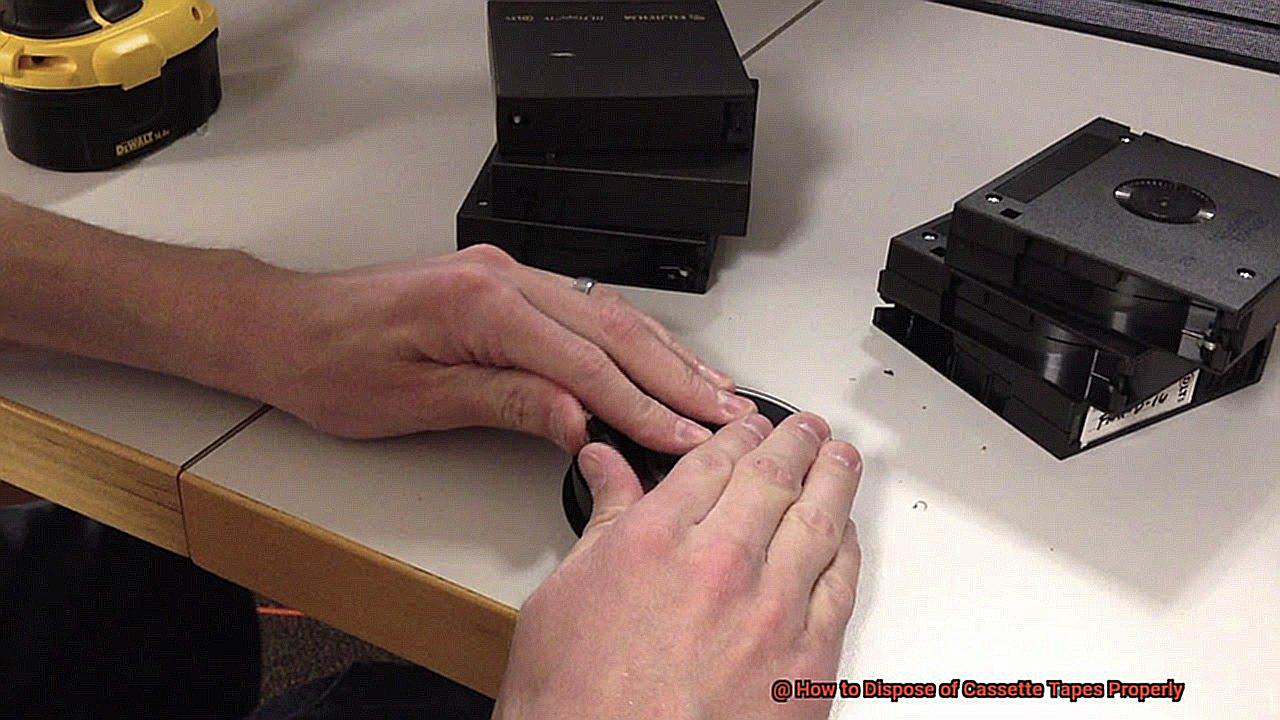Remember the days of the cassette tape? Those small plastic rectangles filled with memories, music and love letters? While the age of cassettes may be long gone, many still have boxes full of them gathering dust in their homes. Whether it’s a beloved mixtape or a treasured recording of a loved one’s voice, these tapes hold sentimental value that can’t be replaced. But what do you do when it’s time to say goodbye?
The answer is simple: dispose of them properly. Cassette tapes contain materials that can harm our environment if not disposed of correctly. Even though they may seem insignificant or outdated, they’re still electronic gadgets that can negatively impact our planet if not handled with care.
If you’re wondering how to dispose of your old cassettes safely, we’ve got you covered. In this blog post, we’ll guide you through the best ways to dispose of cassette tapes without putting yourself or the environment at risk. We’ve outlined some smart and secure methods for recycling or upcycling your old tapes so you can give them new life.
But before you start tossing out those dusty old cassettes, there are some important dos and don’ts to keep in mind. We’ll walk you through everything you need to know about managing your old cassette tapes responsibly.
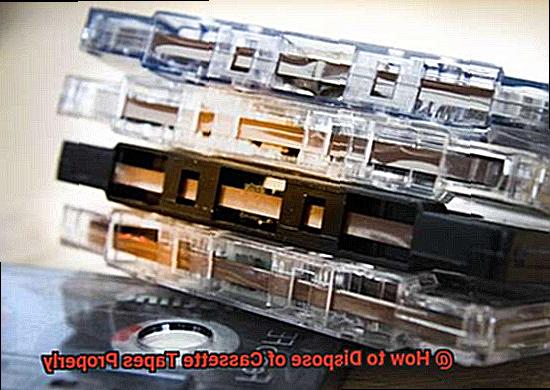
So grab your box of old cassettes and let’s get started on learning how to dispose of them properly.
What Are Cassette Tapes?
Contents
- 1 What Are Cassette Tapes?
- 2 Why Is Proper Disposal of Cassette Tapes Important?
- 3 Reusing and Recycling Options for Cassette Tapes
- 4 Disposing of Cassette Tapes in the Regular Trash
- 5 Removing the Tape from the Plastic Casing
- 6 Cutting the Tape into Small Pieces
- 7 Finding Local Waste Management Organizations or Electronic Recycling Centers
- 8 Conclusion
Invented by Philips in 1963, these small plastic rectangles were ubiquitous by the 1970s. Cassette tapes consist of two miniature spools of magnetic tape coated in a magnetic material that can be magnetized to record audio signals.
Cassette tapes were not just for music but were also used for other audio content such as spoken word, lectures, and personal recordings. They became popular because they were portable and could be played on a variety of devices, including portable cassette players, car stereos, and home cassette decks.
However, the digital age has replaced cassette tapes with CDs and MP3s. Despite this shift, many people still hold onto their cassette tapes for their sentimental value. If you have old cassette tapes lying around, it’s important to dispose of them properly to reduce environmental impact. Thrift stores and some recycling centers accept them or repurpose them into new items.
It’s important to note that improperly disposing of cassette tapes can release harmful chemicals into the environment. So, it’s recommended to remove the tape from the plastic casing and cut it into small pieces before disposing of them in the regular trash.
While cassette tapes may no longer be mainstream, they still hold a special place in many people’s hearts for their nostalgic value.
Why Is Proper Disposal of Cassette Tapes Important?
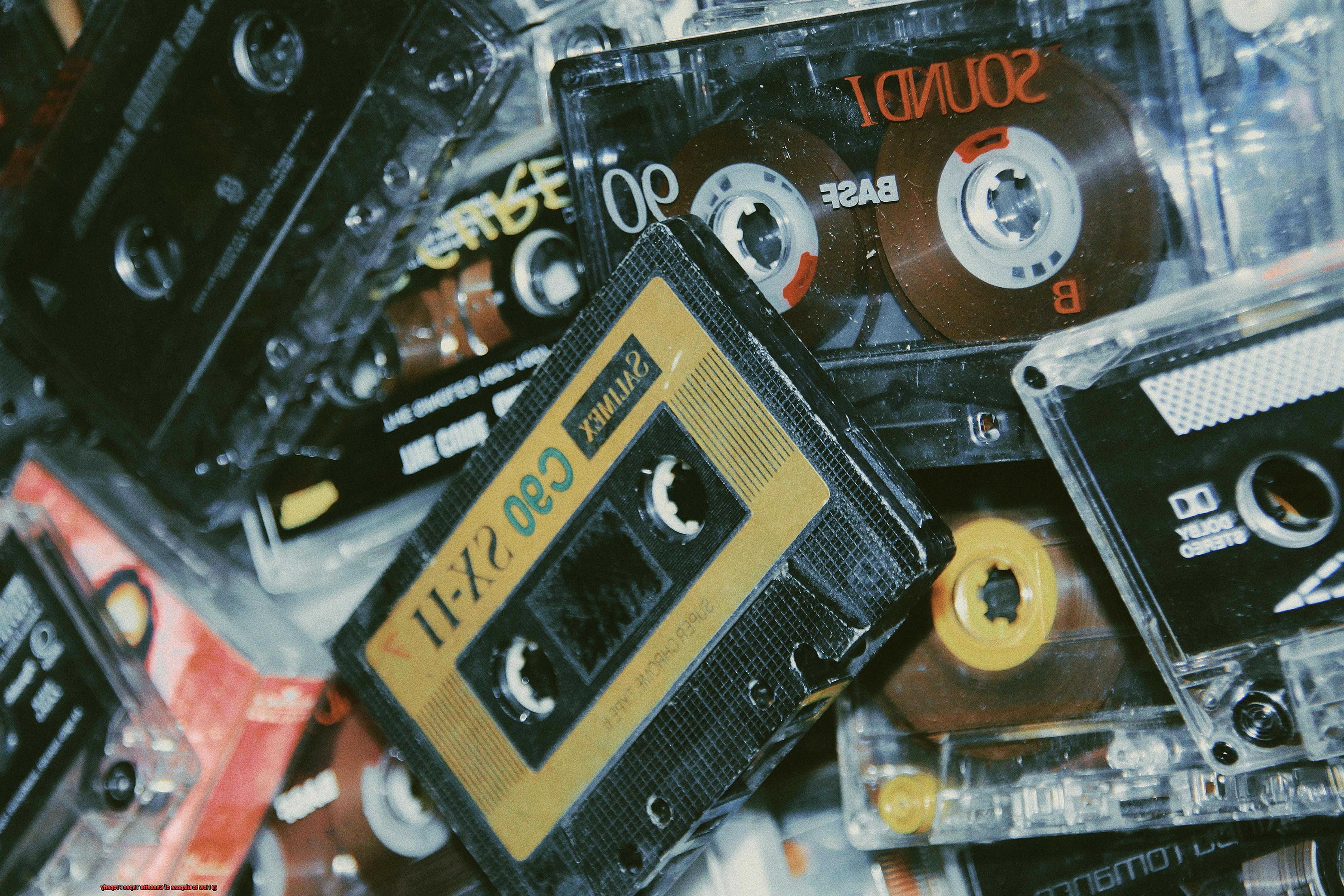
While they may hold sentimental value, it’s important to dispose of them properly to reduce our impact on the environment and protect personal information.
The materials found in cassette tapes such as plastic, metal, and magnetic tape can be harmful to the environment. If not disposed of properly, these materials can take hundreds of years to decompose and release harmful chemicals into the soil and water.
By properly disposing of cassette tapes, we can reduce our impact on the environment and prevent these harmful chemicals from polluting our planet.
However, it’s not just environmental concerns we need to consider. Cassette tapes often contain sensitive or personal information that should not fall into the wrong hands.
Personal recordings, music mixes, and old answering machine messages are just some examples of what could be found on these tapes. To protect your personal information from being obtained by malicious individuals, it’s important to dispose of these tapes properly.
Improper disposal of cassette tapes can also lead to clutter and waste in our homes and communities.
Many people keep old tapes around because they don’t know how to dispose of them properly, which can lead to unnecessary clutter and storage issues.
By taking the time to properly dispose of these items, we can reduce clutter in our homes and communities, making them cleaner and safer places to live.
To dispose of cassette tapes properly, consider finding a local e-waste recycling center or contacting your local waste management facility for guidance on proper disposal methods. Remember to remove any personal information before disposing of the tapes.
Proper disposal of cassette tapes is crucial for both environmental and personal safety reasons.
By taking a few extra steps to dispose of these items properly, we can reduce our impact on the environment, protect our personal information, and create cleaner and safer communities for ourselves and future generations.
Reusing and Recycling Options for Cassette Tapes
Here, we’re going to explore exciting and eco-friendly options for reusing and recycling those old tapes.
Did you know that you can give your old cassette tapes a second life by donating them to organizations such as schools, community centers, or senior care facilities? These organizations may use the tapes for educational purposes or for nostalgic entertainment. It’s an excellent way to reduce waste and share the joy of music and audiobooks with others.
With countless DIY tutorials available online, you can turn cassette tapes into unique jewelry pieces, wallets, or even plant holders. Not only is this a fun way to breathe new life into old tapes, but it also adds a touch of individuality to your accessories.
If reusing isn’t an option, recycling is the next best alternative. However, it’s important to note that not all recycling centers accept cassette tapes due to the difficulty in separating the plastic from the magnetic tape inside.
Check with your local recycling center to see if they accept cassette tapes or if there are any special instructions for recycling them.
If your local recycling center doesn’t accept cassette tapes, there are mail-in programs available through companies such as GreenDisk and The Tape Recycler.
These companies specialize in recycling electronic waste and provide a convenient way to dispose of cassette tapes and other outdated technology while minimizing environmental impact.
In conclusion, properly disposing of cassette tapes is crucial in protecting the environment. By reusing or recycling them, we can give them a new purpose and keep them out of landfills. So remember, the next time you come across an old cassette tape, think twice before tossing it in the trash.
Disposing of Cassette Tapes in the Regular Trash
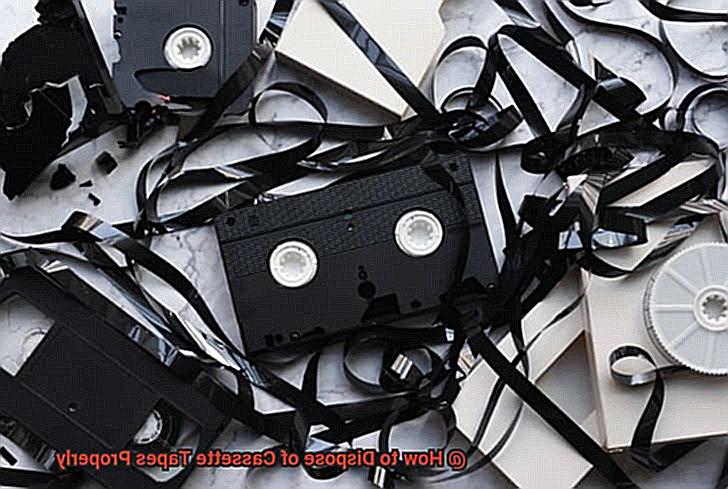
Hold on. Disposing of cassette tapes this way is not only harmful to the environment, but it’s also an outdated method. Cassette tapes are made up of non-biodegradable materials that can release toxic chemicals into the soil and groundwater when dumped in landfills.
Thankfully, there are better alternatives to consider before resorting to the regular trash. The first step is to contact your local waste management facility and check if they accept cassette tapes for recycling. Depending on their guidelines, they may be able to recycle each component separately, ensuring that these items don’t end up in landfills.
If your local facility doesn’t offer this service, no worries. You can still dispose of your old cassette tapes responsibly by separating the tape from the plastic casing and recycling each piece individually. Recycling facilities may accept the tape as a type of plastic, while the casing can be recycled too.
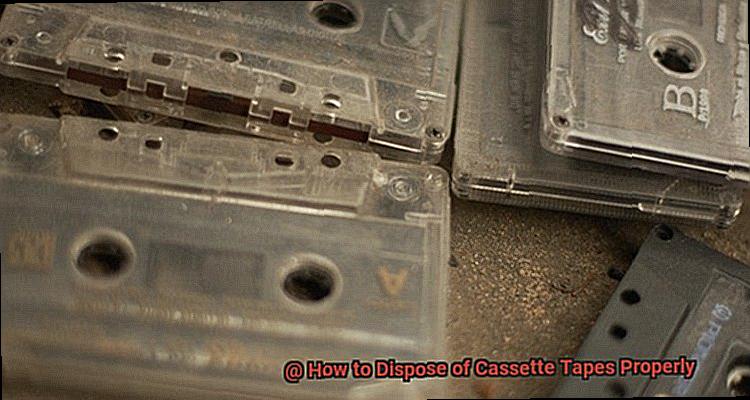
Alternatively, you can repurpose your cassette tapes and give them a new life. From trendy jewelry pieces to unique decorative items, there are many creative ways to repurpose these nostalgic items. This not only keeps them out of landfills but also adds to your home decor or personal style.
Removing the Tape from the Plastic Casing
Before you toss them out or recycle them, it’s crucial to properly remove the tape from the plastic casing. As an expert in this field, let me guide you through the process with ease.
Firstly, it’s important to remember that the plastic casing and magnetic tape require separate recycling processes. Therefore, it’s crucial to remove the tape before disposing of them. But no need to fret. With a few tools, you can do it in no time.
Start by opening up the cassette and removing it from any device. Next, locate the screws on the back of the casing and unscrew them using a small screwdriver. Once the screws are removed, carefully pry open the two halves of the casing using your fingers or a tool like a flathead screwdriver.
Inside the casing, you’ll see the spools with the magnetic tape wrapped around them. Gently unwind the tape from each spool and wind it back up into a loose coil. It’s important to handle the tape delicately as it can easily break if pulled too hard.
Once all of the tape is safely removed from the spools, you can recycle the plastic casing and dispose of the tape properly. Some recycling centers may even accept magnetic tapes for recycling, but be sure to check with your local center first.
By properly removing the tape from the plastic casing, you’re not only doing your part for the planet but also ensuring both materials are recycled correctly.
Cutting the Tape into Small Pieces
Cutting them into small pieces may seem like a good option for disposal, but it’s important to proceed with caution.
Before grabbing those scissors, protect yourself by wearing gloves and a mask. Cutting the tape can release harmful chemicals and particles into the air and environment, so don’t take any risks with your health.
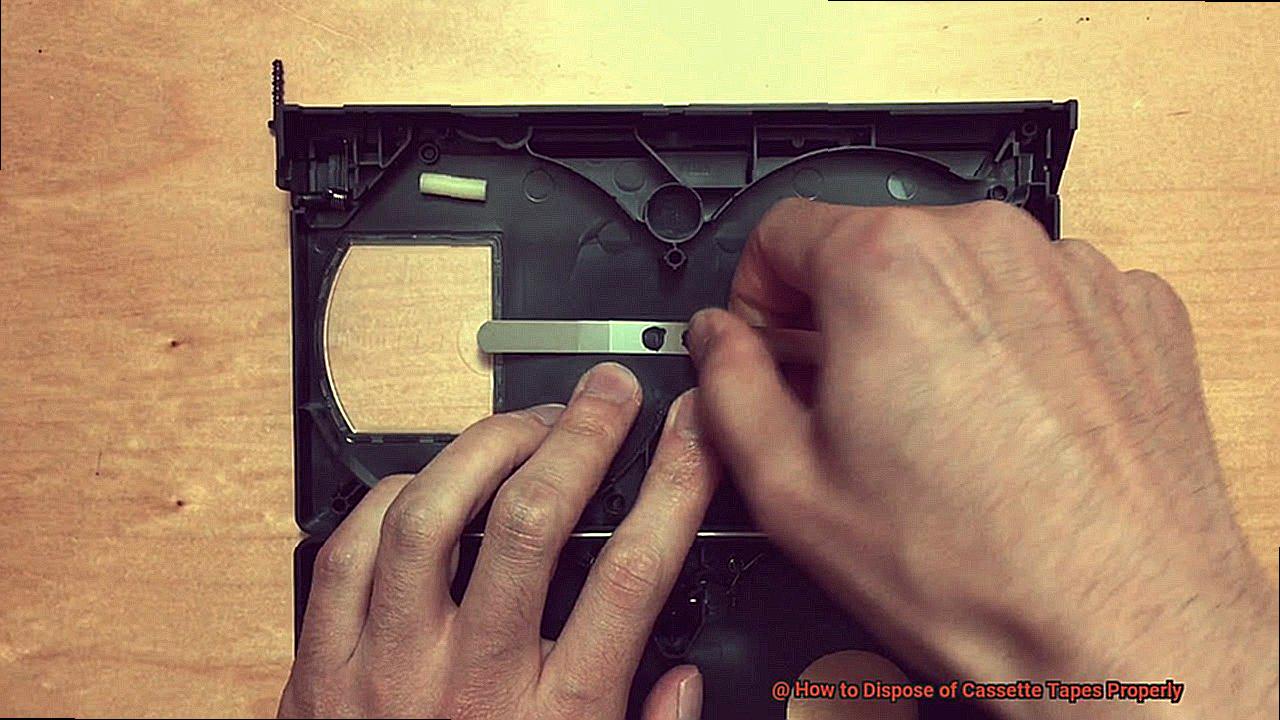
Using sharp scissors, carefully cut the tape into small pieces. Be sure to collect all of the pieces and dispose of them in a sealed container. This will help prevent any potential harm to others who may come into contact with the tape.
But don’t forget to properly dispose of the scissors used to cut the tape. Tossing them in the trash can be dangerous for others, so dispose of them safely and responsibly.
Keep in mind that cutting cassette tapes into small pieces should only be used as a last resort when all other options have been exhausted. Consider recycling or donating them to a thrift store or music shop instead.
Finding Local Waste Management Organizations or Electronic Recycling Centers
A local waste management organization or electronic recycling center can help you recycle those tapes in an eco-friendly way.
So, how do you find one of these facilities? Start by doing an online search using keywords like “electronic recycling center” or “waste management organization” along with your location. You can also check with your local government or municipality for recommendations on proper cassette tape disposal.
It’s essential to choose a reputable and certified facility to ensure proper disposal methods. Look for certifications like R2 (Responsible Recycling) or e-Stewards, which ensure that the facility follows strict environmental and ethical standards. By doing your research beforehand, you can rest easy knowing that your tapes are in good hands.
Before bringing your cassette tapes to the facility, make sure to review their specific guidelines for accepted materials and any fees involved. Some facilities may only accept certain types of electronic devices or have specific requirements for drop-off.
By finding a local waste management organization or electronic recycling center, you’re taking a responsible step towards reducing e-waste and protecting our planet.
jzLAIaJmzJo” >
Conclusion
In conclusion, disposing of cassette tapes properly is a crucial responsibility that we all share. Not only do these tapes contain materials that can harm our environment if not disposed of correctly, but they also often hold sensitive or personal information that should be kept out of the wrong hands. Improper disposal can lead to clutter and waste in our homes and communities, which is why it’s essential to take action.
There are several options available for disposing of cassette tapes properly. You can donate them to organizations such as schools, community centers, or senior care facilities. Alternatively, you can get creative and repurpose them into something new and exciting like jewelry pieces or plant holders. If reusing isn’t an option, recycling is the next best alternative.
However, it’s important to note that improperly disposing of cassette tapes can release harmful chemicals into the environment. To prevent this from happening, it’s recommended to remove the tape from the plastic casing and cut it into small pieces before disposing of them in the regular trash.
Another great option is finding a local waste management organization or electronic recycling center. It’s crucial to choose a reputable and certified facility to ensure proper disposal methods are used.
By taking small steps towards responsible disposal, we can all make a big impact on the environment while protecting our personal information and creating cleaner and safer communities for ourselves and future generations.
